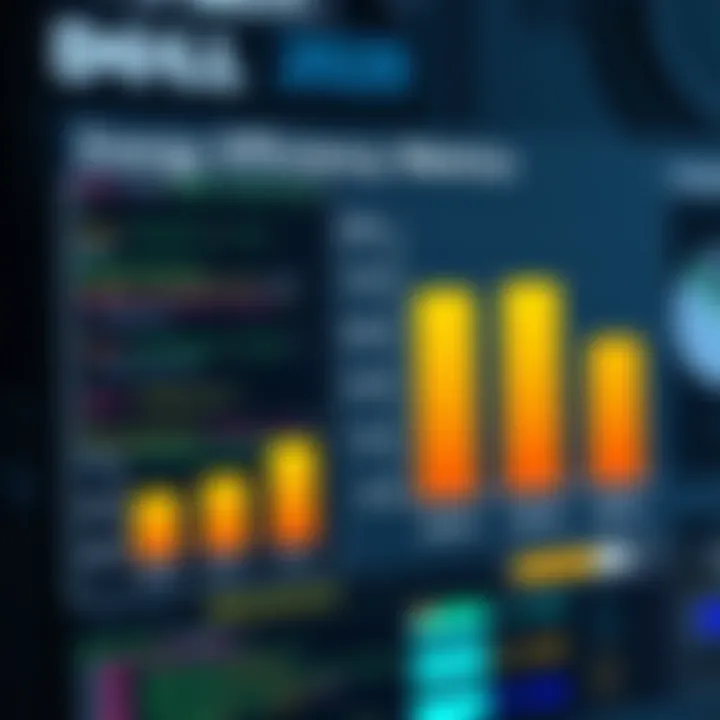Exploring the Dell C6220: Performance and Use Cases


Intro
In the fast-evolving landscape of data centers, the search for reliable and efficient hardware is ever-present. The Dell C6220 server has emerged as a significant player in this sector, particularly noted for its modular design and robust performance. Understanding its capabilities is crucial for IT professionals aiming to optimize their infrastructure. As organizations increasingly turn towards cloud computing and big data analytics, the demand for scalable and energy-efficient technology rises. This analysis aims to peel back the layers of the Dell C6220, delving into its architecture, performance metrics, and the practical applications it supports. By dissecting its features and cuontemplating real-world use cases, this narrative will provide insights into how this server can fit into modern environments.
Overview of Cloud Computing and Data Analytics
Cloud computing has fundamentally reshaped the way businesses manage their data. By utilizing remote servers, organizations can scale resources up or down as needed, thus enhancing flexibility and reducing overhead costs. In this context, the Dell C6220 serves as a key enabler, facilitating rapid deployment of cloud services.
Definition and Importance
Cloud computing is the on-demand delivery of IT resources over the Internet with pay-as-you-go pricing. This model is crucial for companies looking to implement data-driven strategies without heavy upfront investments in physical hardware. On the other hand, data analytics involves examining data to draw conclusions about that information. Together, these two trends empower enterprises strategically, allowing for informed decision-making based on real-time insights.
Key Features and Functionalities
The Dell C6220 boasts a multitude of features that render it suitable for cloud applications and analytics. Here are some noteworthy aspects:
- Modular Design: This server can hold up to four compute nodes, facilitating maximum space efficiency.
- Energy Efficiency: With advanced power management features, the C6220 minimizes energy consumption, essential for sustainable operations.
- Scalability: Companies can easily add more nodes as their needs grow without overhauling the entire system.
Use Cases and Benefits
Organizations can deploy the Dell C6220 in various scenarios:
- Cloud Service Providers: These companies will appreciate the modular structure that optimizes operational costs.
- Research Institutions: For data-heavy research projects, the server can handle immense datasets with ease.
- Financial Services: Real-time data processing capabilities allow for immediate insights, enhancing decision-making.
Best Practices
When implementing the Dell C6220 or similar technology, adherence to certain best practices can make a world of difference.
Industry Best Practices
- Conduct a Needs Assessment: Understand your organization's specific demands before deployment.
- Prioritize Training: Ensure that your staff is well-versed in managing and optimizing the technology.
- Regular Maintenance: Schedule routine check-ups to avoid unexpected downtime.
Tips for Maximizing Efficiency
- Optimize Power Settings: Adjust the power settings to match the workload, which can prolong hardware life and further enhance energy savings.
- Leverage Virtualization: Using software to create virtual environments increases resource utilization significantly.
Common Pitfalls to Avoid
- Over-provisioning: Avoid loading more resources than necessary, which can inflate costs.
- Neglecting Security: Data security should always be a priority; ensure robust protocols are in place.
Investing in a solid infrastructure today prepares businesses for tomorrow's challenges.
Case Studies
Real-World Examples of Successful Implementation
Several companies have successfully integrated the Dell C6220 into their operations:
- A mid-sized tech firm scaled its operations using C6220s, switching to a cloud-based model that resulted in a 40% reduction in costs.
- A healthcare provider utilized the server for managing patient data, resulting in improved access and better analytics.
Lessons Learned and Outcomes Achieved
These cases illustrate the server's flexibility and reliability. Companies reported not only cost savings but improved operational efficiencies as well.
Insights from Industry Experts
Experts emphasize the importance of choosing the right technology tailored to specific business goals. The consensus is clear; the effectiveness of the Dell C6220 makes it a worthy consideration for tech-driven organizations.
Latest Trends and Updates
Upcoming Advancements in the Field
The server market continues to innovate, with trends pointing toward increased automation and software-driven solutions. Retail and cloud service segments are particularly leading these advancements.
Current Industry Trends and Forecasts
- Increased Cloud Adoption: Businesses are progressively moving towards cloud environments, particularly amidst digital transformation initiatives.
- Better Data Visualization Tools: As data analytics becomes more complex, user-friendly visualization tools are gaining traction.
Innovations and Breakthroughs
Industry players are also focusing on incorporating AI and machine learning into their hardware, enhancing decision-making processes and operational efficiencies.
How-To Guides and Tutorials
Step-by-Step Guides for Using the Dell C6220
- Initial Setup: Begin with the physical installation, ensuring all nodes are connected properly.
- Configure BIOS Settings: Tweak BIOS settings for optimal performance based on your operational needs.
- Install Appropriate Software: Choose software solutions that align with your objectives, whether that be cloud management or data analytics tools.
Hands-On Tutorials
- A tutorial on utilizing virtualization can be highly beneficial for beginners looking to maximize the server's capabilities.


Practical Tips and Tricks
- Regularly update firmware to keep systems secure and running smoothly. Additionally, encourage your staff to explore advanced configuration options to fully leverage the server's capabilities.
Prolusion to the Dell C6220
The Dell C6220 serves as a prominent player in the landscape of modern data center solutions, meticulously designed to cater to the diverse needs of today’s tech-forward enterprises. Its modular framework not only promotes efficiency but also emphasizes space-saving virtues, making it a valuable option for organizations operating within tight physical constraints. As cloud computing and big data become increasingly vital components of business strategy, understanding the C6220's capabilities becomes paramount for IT professionals and decision-makers alike.
Overview of Dell's Server Lineup
Dell has carved out a significant niche in the world of server technology, rolling out an array of options that accommodate various business ambitions. Among these, the C6220 stands out with its unique modular architecture, setting it apart from traditional servers. This lineup showcases several other models—like the PowerEdge series—tailored for specific trends in data processing and storage. In essence, the C6220 fits into a broader context as an agile, energy-efficient solution aimed at organizations looking to optimize their server environment without burning a hole in their pockets.
By offering different configurations, Dell ensures flexibility, allowing companies to scale up or down as needs dictate. With a variety of processor selections, memory options, and storage capabilities available, users can customize their setups without compromising performance. Notably, the C6220 can be configured to meet specific workload requirements, providing a level of personalization that appeals to a tech-savvy audience.
Target Audience for the C6220
The Dell C6220 is designed with several specialized audiences in mind. Primarily, it appeals to data center managers and IT administrators tasked with maintaining performance and reliability across a multi-faceted infrastructure. Cloud service providers, for instance, may find the device particularly appealing due to its capacity for deploying large-scale virtual environments.
Additionally, businesses heavily invested in data analytics and machine learning may leverage the advanced capabilities of the C6220 to process substantial amounts of information efficiently.
In a nutshell, the Dell C6220 finds its place in diverse environments:
- Small to medium-sized businesses seeking to expand their IT infrastructure cost-effectively.
- Enterprises that require robust solutions amidst rigorous demands in cloud environments.
- Research institutions and digital agencies focusing on data-driven insights with limited physical space.
Overall, the C6220 provides multiple avenues for scaling and enhancing data center operations, attracting professionals who value efficiency and innovation.
Technical Specifications of the Dell C6220
The technical specifications of the Dell C6220 serve as the backbone for understanding its performance capabilities, scalability, and versatility. It’s not just about numbers; these specs dictate how the server can handle workloads, manage resources, and integrate into various IT environments. Therefore, diving into these details helps IT professionals, data scientists, and software developers gauge how well the C6220 aligns with their specific needs.
Processor Options and Configuration
The Dell C6220 offers a variety of processor options, notably from the Intel Xeon family. It supports configurations that can accommodate dual-socket, quad-socket, and various core count scenarios that are apt for heavy lifting in computational tasks.
Particularly, the ability to configure the server with Intel Xeon E5-2600 or E5-2600 v2 series processors facilitates flexibility. For instance, when using the E5-2699 v4, you can achieve up to 22 cores per CPU, which is beneficial for applications that demand substantial parallel processing.
Key elements of processor selection include:
- Scalability: Server customers can start with a modest configuration and incrementally upgrade as their needs grow.
- Performance: High core counts mean better multitasking in dynamic workloads, notably in virtual environments.
- Cost Efficiency: Choosing the right processor configuration can influence both the initial expenditure and the operational costs over time.
Thus, understanding these options is crucial for businesses looking to get the most out of their investment while ensuring their system meets current and anticipated demands.
Memory and Storage Capabilities
Memory and storage configurations are vital in determining the overall efficiency of the Dell C6220. This server supports up to 768 GB of RAM in a 2U chassis, allowing for significant multitasking abilities and handling of sizable datasets. Using registered DIMMs, businesses can ensure lower latency, which is particularly crucial for applications that require rapid data access.
Additionally, the server provides several storage options, including:
- SAS SSDs: Highly suited for applications requiring high throughput and low latency.
- SATA HDDs: Affordable storage solutions offering large capacities for less critical data.
- NVMe drives: Increasingly crucial for big data analytics where speed is paramount.
This combination means that the C6220 is not constrained by storage bottlenecks and can be tailored according to workload demands. Flexibility in storage choices allows organizations to balance performance and cost-effectiveness as well.
Network Connectivity Features
On the networking front, the Dell C6220 is equipped with multiple connectivity options that can cater to different environments. It typically includes four 1GbE ports on the motherboard for essential networking, with options for higher bandwidth through 10GbE or even 40GbE cards.
Here’s what makes its networking capabilities appealing:
- Flexible Installation: The modular nature allows for upgrading networking cards without disrupting existing configurations.
- Redundancy: Optional features enable failover capabilities, ensuring persistent connectivity even in case of hardware issues.
- Management: Built-in features make it easier for IT teams to monitor performance and configurations remotely, contributing to better operational efficiency.
For organizations looking to deploy the Dell C6220 in environments like data centers or cloud infrastructures, these networking features are crucial for maintaining seamless operations and enhancing data throughput.
The technical specifications of the Dell C6220 don’t just portray its capabilities; they frame the potential impact on business efficiency and performance.
Architecture and Design Innovations
The architecture and design innovations of the Dell C6220 are pivotal to its performance and usability within modern data centers. This section delves into how these elements contribute to the overall functionality of the server, particularly in terms of flexibility, efficiency, and the growing demands of technology workloads. As businesses increasingly pivot towards cloud computing and data analytics, the advantages offered by innovative design become crucial.
Modular Design Approach
One of the standout features of the Dell C6220 is its modular design. This concept allows for a flexible infrastructure that can adapt to varying business needs without necessitating a complete overhaul. The server includes various components that can be easily interchanged or upgraded, enabling users to customize their setups based on current demands.
- Benefits of Modular Design:
- Scalability: Instead of investing heavily in new hardware, organizations can scale up simply by swapping in new modules.
- Cost Efficiency: Skipping on full system replacements can lead to significant savings.
- Reduced Downtime: With components easily accessible, maintenance is straightforward; problems can often be fixed without turning the whole server off.
The modularity also translates to an easier path for integrating new technologies as they develop. Businesses can continuously evolve their infrastructure to support improved processing power or enhanced memory capabilities.
Energy Efficiency Considerations
In today's tech environment, energy efficiency can't be overlooked. The C6220 excels in this area through innovative design choices that focus on reducing power consumption while maintaining peak performance.


- Key Features:
- Smart Power Management: This feature enables the server to dynamically adjust power usage depending on the workload, thereby optimizing energy consumption.
- Cooling Solutions: Efficient cooling systems allow the server to run at high performance without overheating, which can otherwise lead to component failure and increase energy costs.
Incorporating energy-efficient components not only benefits the environment but also decreases operating costs significantly. The Dell C6220 achieves a commendable energy efficiency rating, ensuring that organizations can maintain sustainability goals while enjoying robust performance capabilities.
Aligning with emerging technologies, these design innovations keep the Dell C6220 relevant in a fast-paced industry where efficiency and adaptability are of utmost importance.
Performance Metrics and Benchmarks
The evaluation of server performance is a crucial endeavor that extends beyond raw specifications. In the context of the Dell C6220, understanding performance metrics and benchmarks can separate a commendable system from an exceptional one. These metrics provide insights into the server's efficiency, reliability, and adaptability, especially as businesses face ever-evolving data demands. By assessing how well the C6220 performs under diverse conditions, IT professionals can make informed decisions about deployment and utilization strategies, ensuring that they harness its full potential.
Comparative Performance Analysis
When diving into the comparative performance of the Dell C6220 against other servers, one should consider various metrics such as processor speeds, memory throughput, and I/O performance. Benchmarks such as SPEC CPU, TPC benchmarks, and others offer insights into how the C6220 stacks up within its class.
For example, the C6220 may show commendable performance scores in multi-threaded workloads, which is increasingly pivotal as applications become more demanding. Among its competitors—like the HP ProLiant DL380 Gen10 or Lenovo ThinkSystem SR650—the C6220 holds its own, especially in configurations optimized for virtualization and cloud computing. In a side-by-side comparison, potential buyers might notice:
- Higher transaction rates in database workloads.
- Better energy efficiency when measured in terms of performance per watt, making it a cost-effective choice.
- Superior scalability options, allowing easier expansion based on the organization’s growth.
These factors make the C6220 not just a technical choice, but a strategic asset for any IT infrastructure.
Real-World Performance Scenarios
Understanding theoretical performance is vital, but translating those figures into real-world applications is paramount. The Dell C6220 shines in various scenarios, demonstrating its versatility and robustness. Here are a couple of practical examples:
- Cloud Service Providers: When deployed in a cloud environment, the C6220 efficiently handles multiple virtual machines, maintaining high throughput and low latency. This is particularly evident during peak usage times when multiple clients access resources simultaneously.
- Big Data Processing: Organizations working with substantial datasets find that the C6220 can expedite processing times for analytics workloads. Systems configured with optimal memory and storage options showcase capabilities to handle large datasets using frameworks like Apache Hadoop or Spark with ease.
"Effective use of performance metrics allows organizations to evaluate how the Dell C6220 can maximize their data processing capabilities, reduce operational costs, and streamline deployment."
Ultimately, understanding these performance benchmarks helps not only in making a sound investment decision but also in creating a framework for future scalability. The road to effective utilization lies in recognizing how well the Dell C6220 can adapt to your specific needs, whether it be through cloud software deployment or intensive data analysis.
Use Cases for the Dell C6220
The Dell C6220 is a workhorse in modern data centers, designed to tackle various workloads and applications. While its specifications and design innovations make it a compelling choice, understanding its use cases is equally important. This section highlights how the C6220 thrives in multiple scenarios, offering insights into its adaptability and performance._ By understanding these use cases, IT professionals can better align their infrastructure needs with the capabilities of the C6220._
Deployment in Cloud Computing Environments
Cloud computing continues to gain traction as a flexible solution for businesses seeking scalability and efficiency. The Dell C6220 plays a vital role here by delivering an architecture that seamlessly integrates with cloud services. One of the foremost advantages is its modular design, allowing for quick scaling as demand fluctuates. Consider a development team working on a web application that unexpectedly goes viral; they need to scale their resources up in a heartbeat, which the C6220 enables with ease.
Advantages of deploying the C6220 in cloud environments include:
- Modular expansion: Businesses can start with a modest configuration, then easily add servers or upgrade components without uprooting existing installations.
- Energy efficiency: In a data center environment, energy costs can run wild. The C6220's design optimizes power consumption, making it a power saver's friend.
- Reliability: Featuring impressive redundancy options, including failover mechanisms, the C6220 ensures uptime is preserved even during unforeseen issues.
Operationally, organizations benefit from enhanced agility in deploying applications. The quick provisioning capabilities provided by the C6220 reduce the time taken to get services up and running.
Big Data and Analytics Applications
The Dell C6220 is more than capable of handling data-heavy tasks. In an age where businesses generate immeasurable amounts of data daily, the demand for robust hardware to analyze this information has skyrocketed. The C6220’s architecture is particularly well-suited for big data applications, delivering both the performance and scalability required to process insights efficiently.
When it comes to big data analytics, three key aspects stand out:
- Processing Power: Equipped with powerful processors, the C6220 efficiently processes massive data sets, enabling real-time analytics.
- Memory Capacity: With support for substantial memory configurations, the C6220 can manage multiple applications simultaneously without missing a beat.
- Storage Solutions: Coupled with extensive storage options, the server accommodates growing databases and analytics workloads.
For instance, a financial services company may deploy the C6220 to sift through large quantities of transactions daily, identifying trends and potential risks in real-time. The responsiveness offered by this setup ensures that they stay ahead of fraud attempts, significantly safeguarding their operational framework.
Size Constraints and Data Center Solutions
In the realm of data centers, physical space can be a significant limitation. The Dell C6220 is particularly useful when dealing with spatial constraints, and it’s not just about being compact; it’s about making the best use of available resources. This server's modular approach allows for high-density configurations, which makes it a perfect fit for spaces where optimizing real estate is paramount.
Advantages include:
- Reduced Footprint: The C6220 offers multiple nodes in a single chassis, allowing for a dense arrangement that utilizes space effectively.
- Improved Cooling Efficiency: Some data centers struggle with cooling issues due to dense setups. The C6220’s design emphasizes airflow management, helping maintain temperatures in check.
- Cost Savings: By maximizing space, businesses can potentially cut costs on real estate rentals or purchases, aligning well with budget-sensitive projects.
For instance, in urban settings where data centers can be scarce, a company handling massive amounts of user data might find that the Dell C6220 enables them to fit more computing power into a smaller area, a game-changer for their bottom line.
The various contexts in which the Dell C6220 thrives demonstrate its versatility. Organizations can confidently leverage its capabilities to adapt to changing demands and operational goals.
Cost Considerations and ROI
Understanding the cost dynamics of the Dell C6220 is key for IT decision-makers. This section aims to illuminate the nuances surrounding the initial investment, long-term benefits, and overall return on investment (ROI) that this server can provide. In an age when budgets are tighter than an old wallet, it's crucial to grasp these financial aspects to make effective choices in technology procurement.
Initial Investment vs. Long-Term Benefits
When looking at the Dell C6220, the initial investment might raise eyebrows, as it's not the cheapest solution on the market. However, weighing this against its long-term benefits sheds light on its value proposition. Here are a few points to consider:
- Upfront Costs: The cost of procurement can include not only the price of the server itself but also ancillary expenses such as installation, configuration, and necessary networking gear. For a data center, this can add up quickly.
- Energy Efficiency: The C6220 is designed with energy conservation in mind. This translates to reduced power bills over time. Such savings can significantly offset the initial costs. Many organizations may find that their operational savings over a period of years can dwarf the initial investment.
- Scalability: The modular nature of the Dell C6220 allows for incremental upgrades. As business needs grow, adding more compute resources doesn’t necessitate a complete overhaul of existing infrastructure. This flexibility means organizations can spend wisely as their needs evolve, reducing the financial strain of rapid growth.
- Reduced Physical Footprint: The ability to pack more processing power into a smaller space means reduced real estate costs in data centers. This is often overlooked but can have a substantial impact on overall operational costs.
Cost of Ownership Analysis
Digging deeper, an effective cost of ownership analysis reveals the hidden costs associated with operating and maintaining the Dell C6220. It’s tempting to focus only on the initial investment, but understanding ongoing costs is equally crucial.


- Maintenance Expenses: Even the most reliable hardware requires some maintenance. Factor in service contracts, routine maintenance, and potential hardware replacements. The C6220 generally elicits lower maintenance costs due to its robust design, but it's wise to plan for the unexpected.
- Labor Costs: Consider the human resources needed to deploy, manage, and troubleshoot the server. With the C6220’s user-friendly interface and comprehensive support options, labor costs can remain manageable compared to less intuitive systems.
- Longevity and Depreciation: The longer a server lasts without major issues, the better the ROI. The C6220 is recognized for its durability. Depreciation schedules can impact overall cost significantly; thus, investing in reliable hardware can improve financial metrics over time.
In sum, while the Dell C6220 may require an initial outlay, its long-term benefits and cost efficiency make it a savvy choice for businesses looking to optimize their IT investments. Overall, calculating actual ROI demands a comprehensive look at both up-front costs and ongoing expenditures. An organization needs real clarity on these elements to make informed decisions.
"Investing in technology is a marathon, not a sprint. Evaluate each step carefully to ensure you're not just chasing the lowest ticket price, but maximizing your return in the long run."
For more insights and thorough comparisons involving the Dell C6220 and similar alternatives, check out resources like Wikipedia or industry Reddit discussions.
Understanding these nuanced financial aspects is vital for any decision-maker in the tech ecosystem.
Maintenance and Support for the Dell C6220
The Dell C6220 is a serious piece of tech, built to handle heavy workloads and demanding applications. However, like any high-performance server, it requires appropriate maintenance and support to ensure reliability and longevity. In a world where downtime can be costly, having a solid maintenance strategy in place is crucial.
Warranty and Service Options
When investing in the Dell C6220, understanding the warranty and service options available is fundamental. Dell provides various warranty plans that can be tailored based on the specific needs of your organization. Some of these common options include:
- Limited Hardware Warranty: A standard plan that typically covers a range of hardware failures, offering peace of mind that your investment is protected.
- ProSupport: This service provides advanced technologies, including 24/7 access to expert support, on-site assistance for urgent issues, and faster repairs to minimize downtime.
- ProSupport Plus: A more comprehensive service, this combines proactive management with all the benefits of ProSupport plus accidental damage protection.
These options are often customizable, allowing businesses to choose the plan that best suits their operational priorities. Notably, opting for ProSupport or ProSupport Plus can be a wise decision for organizations that rely on continuous uptime and mission-critical operations.
Troubleshooting Common Issues
Despite its robust design, users may encounter common issues with the Dell C6220. Knowing how to troubleshoot these problems can save valuable time and resources. Below are some typical issues and straightforward solutions to consider:
- Overheating: Check the server's airflow and make sure that all fans are operational. Sometimes, dust build-up can lead to overheating, so regular cleaning is necessary.
- Boot Failures: If the server won’t boot, inspecting the power supply and verifying hardware connections can help. It’s good practice to monitor any error codes displayed during the boot process.
- Network Connectivity Problems: For issues related to network connectivity, ensure that the network configuration is correctly setup. Cable connections should be double-checked, and updates to NIC drivers could resolve connectivity failures.
Tip: Regular maintenance, including checks on firmware updates, backup solutions, and network configurations, can often prevent these common problems and support the efficient functioning of the Dell C6220.
Keeping an eye on these aspects will not only maintain the server's health but also extend its lifespan, ensuring that it continues to meet the demands of your data-driven operations.
Links for further reading:
Future Developments and Upgrades
The landscape of technology is always shifting, and as such, staying updated on potential developments and upgrades for the Dell C6220 is a vital discussion point for IT professionals, data scientists, and tech enthusiasts alike. Understanding how the C6220 can evolve will not only assist businesses in making informed decisions but will also keep them competitive in an increasingly sophisticated environment.
Potential Upgrades in Hardware
As demands for computing power and storage capacity grow, the Dell C6220 is likely to receive several hardware upgrades in the coming years. These enhancements can include:
- Processor Enhancements: With Intel and AMD constantly releasing more powerful processors, integrating newer models into the C6220 can substantially boost performance. Newer CPUs will handle more threads, enable faster data processing, and improve energy efficiency.
- Memory Expansion: As applications become more memory-intensive, increasing RAM capacity is crucial. Future upgrades may allow for higher RAM limits, thus facilitating better multitasking and faster data retrieval.
- Storage Options: The growing importance of data storage solutions will likely result in advancements in storage technology. Implementing NVMe drives and supporting larger SSDs could dramatically increase throughput and storage efficiency, accommodating the needs of data-heavy applications.
Investing in these hardware upgrades can pay off significantly, providing that the C6220 remains relevant for future workloads.
Adapting to Emerging Technologies
As the tech landscape continues to evolve with the introduction of various new technologies, the Dell C6220 must be adaptable to harness these innovations. Here are some expected areas for adaptation:
- Cloud Computing Features: The continued rise of hybrid cloud solutions calls for capabilities that optimize both on-prem and cloud-hosted environments. Enhancements might include better integration functionalities or even dedicated infrastructure for cloud management.
- Artificial Intelligence and Machine Learning Integration: As AI and ML become more widespread, the C6220 will likely need to support specific workloads that require powerful processing capabilities. This may involve tailoring hardware specifications to efficiently run complex algorithms.
- Security Enhancements: With security threats on the rise, increasing the robustness of security protocols within the hardware could be an essential focus. This adaptation would include improved encryption capabilities and tighter security protocols to protect sensitive data.
Adapting to emerging technologies enables the Dell C6220 not just to keep pace, but to lead in areas where innovation is key. Businesses committed to future-proofing their technology investments will find an adaptable server like the C6220 invaluable.
In the swiftly evolving tech world, the ability to upgrade hardware and adapt to new technologies can determine a company's longevity and market competitiveness.
By staying on top of these potential developments and upgrades, businesses can ensure they effectively leverage the benefits of the Dell C6220, making it a noteworthy asset in their tech arsenal.
End and Recommendations
The Dell C6220 stands out as a notable contender in the server landscape, particularly for enterprises leveraging cloud computing and big data analytics. In today's dynamic tech environment, scalability, performance, and efficient resource utilization have never been more crucial. The C6220 is engineered to address these demands with its modular design and energy-efficient architecture.
When considering the deployment of a system like the C6220, it's vital to weigh multiple facets such as total cost of ownership, potential return on investment (ROI), and the flexibility it provides for future technology upgrades. These elements play a significant role in ensuring that businesses not only meet their immediate processing needs but also future-proof their IT infrastructure.
Among the benefits, let's recap a few key takeaways that detail the strength of the Dell C6220:
- Versatile Configurations: The adaptability of the C6220 allows for customization based on specific operational requirements.
- Cost-Efficiency: Though the initial investment may appear steep, the long-term savings from energy efficiency and reduced physical footprint can greatly affect the bottom line.
- Scalability: The system grows with your business, easily accommodating workloads and future technologies without substantial overhauls
Considering these aspects, it's recommended that organizations conduct a thorough analysis of their specific needs and available resources before making a purchase. Conducting a comparative study against competitor solutions can further illuminate the most suitable path forward.
As organizations navigate their digital transformations, ensuring that they have the right tools in place becomes paramount, and the Dell C6220 certainly merits consideration.
"In an ever-evolving tech landscape, the right server choice can propel your operational success."
Summary of Key Points
The Dell C6220 offers a wealth of features that cater to modern data center requirements:
- Processor Options: Supports a wide range, optimizing for various workloads.
- Memory and Storage: Flexible configurations enhance performance and scalability.
- Network Features: Robust connectivity options ensure seamless integration.
- Energy Efficiency: Engineered to operate with reduced power consumption.
The analysis showcases that the C6220 is not merely a product but a comprehensive solution for those looking to invest in their technological future.
Final Thoughts on the Dell C6220
By embedding energy-efficient practices, it contributes not only to operational excellence but also to sustainable IT practices. As businesses contemplate their next steps in infrastructure investment, the Dell C6220 should remain firmly on their radar.
For further reading on performance metrics and scalability, resources such as Wikipedia and Britannica provide deeper insights into modern server technology.



